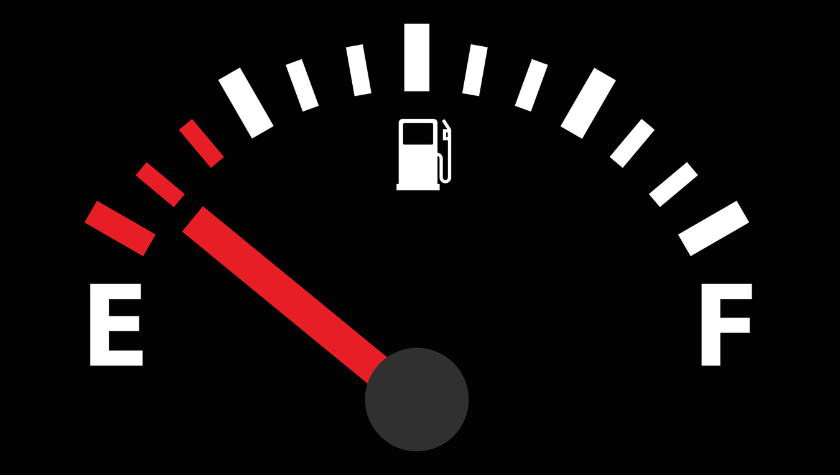Writer’s block isn’t real. It’s not something that should be feared by writers, whether you’re writing novels or screenplays. It is nothing more than an over-generalized term for the multiple hurdles all writers must face, overcome, and adapt to in their writing process.
It’s true. Any writer that has felt that lingering weight on their shoulders perceived as the mystical condition writer’s block should take solace knowing that they don’t have to be a victim to it any longer.
To truly conquer a problem, it’s best to explore and understand every dynamic and angle of it. For writers battling with supposed writer’s block, and for those who want to avoid it, you must first be able to identify what it really is, what triggers it, and how you can put a stop to it before it takes hold.
With that in mind, here we present seven ways to identify and prevent what most people initially attribute to being the dreaded writer’s block.

1. You’re Running Low on Creative Fuel
We all get to a point where we’re struggling to find inspiration for our stories. We’ve either done a great job of writing what has been in our head with nothing more in the creative tank, or we have yet to find that one amazing spark of a concept that drives us to not just want to write something, but to the point where we need to write something.
This isn’t writer’s block. It’s simply the lack of inspiration you need to take an idea or concept to the next level.
Anyone can come up with general story ideas. True writers can find ways to conjure inspired ideas worthy of the page.
Try This:
Too many writers make the mistake of believing that inspiration will eventually come. Inspiration doesn’t always find you. Sometimes you need to go find it. When you’re in a creative rut:
- Go watch new movies and new TV series.
- Read a new book.
- Watch interesting documentaries.
- Listen to music.
- Go on walks, runs, or bike rides.
- Go on vacation.
You can find inspiration in so many different places. Sometimes you just need the patience to take the time to find it.
Don’t just sit there in despair waiting for writer’s block to fade away. There’s no time for that. You need to go on a quest to find inspiration for yourself, avoiding the trap of waiting for it to come to you.
2. You’re Mistaking Avoidance and Laziness for Writer’s Block
Let’s be honest. Sometimes it’s not about being blocked. It’s actually more about avoidance — choosing anything over sitting down to develop and write a story.
We’re not trying to be judgmental here. It’s human nature. Every single writer in the world, successful or not, can be lazy, choosing to avoid the work that writing entails. And then we attribute it to writer’s block to make ourselves feel better.
Writing is vulnerable work. It takes effort and commitment to write a book or screenplay. The writing process is full of ebbs and flows of success and inspiration. Because of this, writing can be mentally exhausting at times, especially for undiscovered writers juggling the day-to-day responsibilities of school, work, marriage, parenthood, etc.
So instead of writing, you:
- Clean or do choirs around the house.
- Scroll through social media.
- Tell yourself, “I’m just not feeling it today.”
But then days turn into weeks and weeks into months. That’s not a block. It’s avoidance wrapped in comfort.
Try This:
Ask yourself one brutal question, “Do I generally want to write, or have I just been talking about being a writer?” Too many people see writing novels, and especially screenplays, as a way to get rich quick. If that’s your sole objective, you’re never going to have the passion and drive to avoid this block. Those who truly want to be writers usually can’t contain their excitement to do just that — write.

3. You’re Too Comfortable in Familiar Territory
Everyone gets bored doing the same thing over and over again. One of the sneakiest things that slows writers down is creative repetition. When you stick to the same genre, tone, or structure every time, you risk burning yourself out. The work becomes more and more formulaic, and you can find yourself getting bored with what you used to love.
That’s not writer’s block. It’s complacency. And complacency can be poison when it comes to finding inspiration.
Try This:
Try something different. Step outside of your usual lane, even if you’ve showcased success, perfection, or prowess in that lane.
- If you’re a comedy writer, try melding that with another genre like action or horror.
- If you’re an action writer, try writing something more dramatic.
- If you’ve written a bunch of screenplays, try to write that first novel.
- If you have written novels and want to try your hand at screenwriting, try adapting one for the screen.
- If you usually write in a three act structure, try mixing things up by beginning at the climax, and then show how your character(s) got there.
- Write something that scares or intimidates you. Growth often hides on the other side of discomfort, and so does creative energy.
- Write under some tighter personal deadlines. Deadlines can force you to be even more creative.
4. You’re Not Focused
We live in a world full of distractions. Notifications are constantly pinging, emails are constantly popping up, and it’s so easy to fall into the pit of scrolling social media platforms. It’s nearly impossible to sink into a fictional world when the real one is yelling for your attention every five seconds.
When this happens, you get distracted. Your brain is too busy processing all of this fragmented information and the creative energy you need to build fictional worlds, and characters is pushed aside as you consume endless content bites.
It goes beyond our phones and the internet as well.
If you’re writing at home, you could be distracted by siblings, spouses, kids, etc. If you’re writing in a public space (coffee shops, college libraries, etc), you can get distracted by the flow of people around you, the music in coffee shops, and even snacks/drinks you may be partaking in (many of which can over-caffeinate you or get you on some mad sugar rushes and crashes).
Distractions cause you to lose focus. And when you can’t focus on the writing task at hand, you’ll find yourself staring at that blank screen with nothing to type.
This isn’t writer’s block. It’s you not finding the right discipline, time, and place where you can focus solely on your writing.
Try This:
Designate the perfect writing space for you where you are as distraction-free as possible. If you need to write from home and there are still distractions around you, find a temp track playlist of atmospheric music (non-iconic movie scores work best) and put those headphones on or earbuds in. Do the same for any public spaces you’ll be writing in.
- Silence your phone.
- Block social media.
- Set a specific amount of time to give your full attention to your writing.
You don’t need a secluded cabin in the woods (although such seclusion now and then is nice). You just need a commitment to boundaries.

5. You’re Writing Without a Compass
Inspiration can only get you so far in your writing. You still need to do the work. Not knowing what happens next in your story can feel like hitting a wall, but it’s usually not a block. It’s a lack of preparation.
That amazing concept is just a seed — and that seed needs to grow.
- Your concept needs a story.
- Your story needs a world as a setting.
- Your world needs to be populated by characters.
- Your characters need to face conflict.
- Your conflict needs to multiply and evolve to keep things interesting and engaging.
You can’t conjure all of these things on the fly without a general direction to guide you. That direction comes in the form of preparation. If you don’t do the front end work of story and character development, you’re going to find yourself staring at that blinking cursor once again waiting for these elements to come to you in the moment.
Try This:
Every writer eventually finds their own go-to process, and processes will vary between writers. However, all writers need direction. Here are some tips to get prepared.
- Do research for your worlds, characters, genres, etc.
- Conjure the movie trailer for your story, where you see the broad strokes of the beginning, middle, and end.
- Outline your story from Point A to Point Z in the form of general beat sheets that can be changed and reorganized.
- Visualize your next scene or chapter before you type a single word during your next writing session.
Story, character, and visual maps can help you gain daily clarity when you sit down to write. Maps can be adjusted. You just need to know where you’re headed to begin with.
6. You’re Suffering from Paralysis of Analysis
Front end work is great, but you can also do a bit too much and get quickly overwhelmed by the details. There is such a thing as being too prepared. When you’ve read every screenwriting book, taken every class or workshop, watched every how-to video, listened to every writing advice podcast, and have outlined every outline of your outline (complete with full back story that you may or may not use), sometimes you trap yourself in the over-analysis of your writing.
- You know all of the story formulas, but you’re afraid to write a sentence that doesn’t follow the rules.
- You’ve studied creative writing or screenwriting to the point that you’re paralyzed by it.
Sometimes writers overwhelm themselves with details. When you get overwhelmed, you shut down. But this isn’t writer’s block. This is the paralysis of analysis, and it can stop you in your tracks during your writing process. You can find yourself too busy trying to hit Note A, matching it with Note B, while setting up Note C that your creative juices stop flowing.
When Steven Spielberg directed the now-iconic opening battle sequence for Saving Private Ryan, he decided to opt out of his normal storyboarding process, instead choosing to conjure his shots on each day of shooting. He said that it gave him more creativity and options.
Try This:
Less is more.
- You don’t need to know every little detail about the world, the story, and the background of your character(s).
- You don’t need to worry about hitting story beats on particular page counts.
- You don’t need to know every scene and every beat going into the writing process.
Leave some room for discovery. And, perhaps even more important, only focus on the details you need to tell your story within the story window that you’ve chosen.
7. You’re Using Writer’s Block as an Excuse
Sometimes the reason writers blame writer’s block is because they’re afraid. Writers struggle with fear and insecurity, from newcomers to seasoned and successful professionals.
- The fear of not being good enough.
- The fear of failure.
- The fear of disappointing loved ones.
- The fear of industry rejection.
- The fear of disappointing ourselves.
- The fear of ruining a story.
Other times, writers blame writer’s block because the term has been used so loosely over the years that the definition of it has been forever lost. It’s become this vague and heavy term that writers can point to when things aren’t going well.
However, when you break it down and define it as running low on creative fuel, avoidance and laziness, complacency, lack of focus, lack of preparation, paralysis of analysis, or an overall excuse, you can give yourself the power to address it directly. You stop waiting for the fog to lift and start clearing it out yourself.
Writing isn’t easy. It’s all about showing up, over and over again, even when it’s hard.
But when the creative juices start to flow, there’s no better feeling — no better magic — than watching your story and characters come to life where nothing existed before.
When these things happen on your writing journey, you’re not suffering from writer’s block. You’re just one step away from writing again by identifying what the problem may be or preventing it from happening in the first place.


